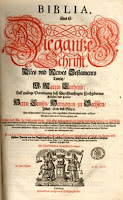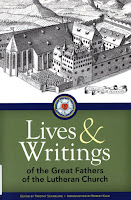- - - - - - - - - - - - - - - - - - - - - - - - - - -
Excerpt from Evangelisch-Lutherisches Schulblatt, vol. 8 (1873) pp. 65-74, 107-116; translation by BackToLuther; all highlighting, red text in [] square brackets, images, and hyperlinks are mine, underlining in original.
Copernicus and the Lutheran theologians.
[by J. C. W. Lindemann, Part 4 of 8, pp. 73-74]
J. M. Dillher [De] (born 1604, died 1669 as pastor and professor in Nuremberg) writes in his “Zeit- und Weltlauf” (a kind of calendar, printed in 1657) [1670 edition?]: “Experience shows that this is done by the Sun and the Moon, For the all-wise God has ordered the Sun so that it does not always stay in one place or point in its circle, but progresses one step every day in its circle; and ascends soon, then descends again; that she is closer to us than at the other time; hence the air is warmer than the time after the Sun is near or far from us” (p. 7). — Further (p. 281): “And although the Earth stands in the center, it still has no pillars on which it rests; but God hangs the Earth on nothing, Job 26. The Earth itself is the most central of the whole world building.”

Anyone who knows the Nuremberg or Weimar Bible [🔗,Wiki, German site; or “Elector’s Bible”], first published in 1641 and then printed repeatedly, will certainly agree with me if I assert that in all explanations of the relevant Scriptural words it knows only of a fixed Earth and a moving Sun; but some examples may serve as evidence.
On Joshua 10:13 it comments: “Sun and Moon did not continue to circulate among the firmament.” — On Ps. 19:7 it speaks of the Sun: “their movement is certain every day, constantly, infallibly.” — Ps. 104:19 also speaks of the Sun: “It repeats its course and accomplishes its [page 74] Sunset every day, with such infallible certainty and constancy that it seems as if she had a high level of understanding.” — Job 9:7, again on the Sun: “It leaves its natural, normal course, and either stands still as before Joshua time happen, or go back, as in the times of King Hezekiah, or do not go up at all, which is so easy for God to do than that one.” — So one can also compare Sir. 43:5, 46:5 and many other places.
The authors of these explanations [in the Weimar Bible] were sincere but efficient theologians, as much distinguished by erudition as godliness. And one is certainly not wrong when he says that they, in regard to the Copernican world system, have had all the same opinion. Unity based on Scripture was an indispensable prerequisite for church fellowship and joint work for those dear men. Now that it is important to show that it is not a few theologians who have preserved the worldview of the Bible, but that a very significant number have preferred God's testimony to that of the “scholars”, it is certainly appropriate to use the names of those men (from J.E. Berger's Lessons from the German Bibles, Berlin 1719, p. 26 ff.) [🔗; see also here 576 ff.].
 |
| Weimar Bibel: J. Gerhard & orthodox Lutherans |
These were: Dr. Johann Gerhard, Professor of Theology at Jena (1637); M. Joh. Ilschner, Arch-Deacon at Sondershausen; Dr. Barth. Elsner, professor of theology at Erfurt; Dr. Nic. Zapf, [pic ready;1600-1672, de.wikipedia; *, #] also professor of theology at Erfurt; Dr. Joh. Groshaim; Dr. Anton Mylius, court preacher at Cranichfeld; M. Hipol. Hubmayer, Superintendent zu Holdburg; M. Joh. Moses, Arch-Deacon at Ortruff near Gotha; M. Joh. Müller, Arch-Deacon at Jena; M. Schlevogt, Professor zu Jena; Joh. Mich. Dillher, also Professor zu Jena; Dr. Salomon Glassius, also a professor at the said university; Dr. Johann [Georg] Weber [1657-1758], superintendent of Weimar; Joh. Kromayer, General Superintendent of Weimar; Dr. Andreas Kessler, General Superintendent in Coburg; Thilo, Arch-Deacon at Gotha; M. Sigism. Evenius, church and school council; Dr. Arnold Mengering, then court preacher in Altenburg; M. Hier. Praetorius (🔗?), superintendent of Schleusingen; M. Chr. Cellarius, superintendent at Schmalcald; Dr. Joh. Major, professor and superintendent of Jena; St. David Lippach, superintendent of Arnstadt; Dr. Joh. Himmel; M. Joh. Sutorius, superintendent of Eisenberg; St. John Grabius; St. Joh. Seiler, Arch-Deacon of Weimar, and finally St. Caspar Neander, pastor of Lobstätt near Jena. — We will be able to prove that some of these specifically rejected Copernicus's opinion.
= = = = = = = = = continued in Part 5 = = = = = = = = = =Lutheran Orthodoxy or LC-MS / ELS / CPH?


Two of the theologians associated with the Weimar Bible, Gerhard and Glassius, were featured in the 2016 Concordia Publishing House book edited by Timothy Schmeling, Lives and Writings of the Great Fathers of the Lutheran Church. Although this book is refreshing in its general praise of the Lutheran orthodox theologians, I would have to ask editor Prof. Schmeling, a teacher not of the LC-MS but the ELS, whether he and his essayists believe that the theologians from their book, Gerhard, Dieterich, Herberger, Glass(ius) etc., would have changed their position against Copernicanism given today's "science", particularly Einstein's Theory of Relativity that asserts that it is objective truth? And if their answer would be "No", then how is that they can praise these theologians while they, as theologians of today's LC-MS and the ELS, officially hold against their theological position on Copernicanism? I would ask them, "Who is the greater historian: J. C. W. Lindemann or themselves?" — In the next Part 5…



No comments:
Post a Comment
Comments only accepted when directly related to the post.